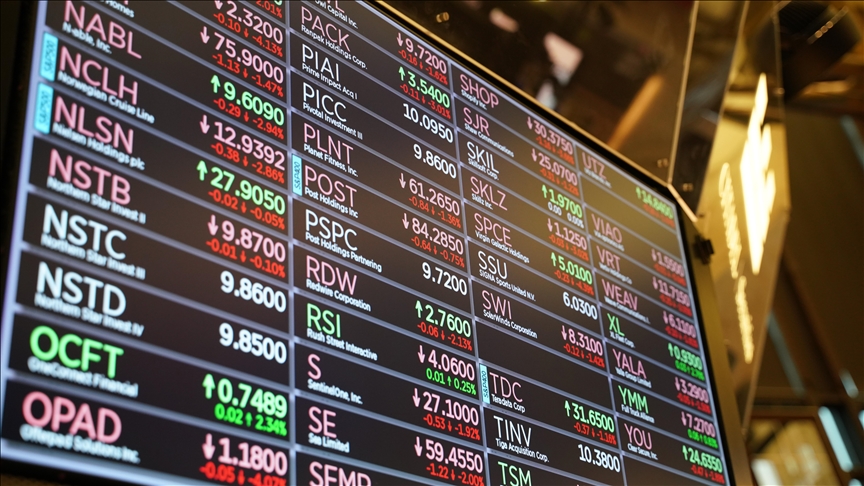ISTANBUL
Global markets followed a mixed course last week amid tensions in the Middle East and mixed signals from the US economic activity, while all eyes turned to US inflation data to be announced next week.
Projections for a “soft landing” optimism in the US economy and US inflation to drop to the 2% target strengthened, while recession concerns still persist.
Fed Chairman Jerome Powell said at a recent event that further cooling in the labor market conditions is not needed, and if the economic outlook stays as expected, there could be two more rate cuts this year, amounting to 50 basis points in total.
Other Fed officials signaled that they are open to another large rate cut so long as the labor market is weakened, as a weak employment data could prompt the bank to push for a move due to urgency.
Meanwhile in the Middle East, the Iranian Revolutionary Guards launched a ballistic missile attack on Israel, and while tensions remain high in the region following threats of retaliation by Israel, Iran’s threats continue.
Although US employment data signaled a soft landing, geopolitical risks in the Middle East continue dampening risk appetite, analysts say.
The US Institute for Supply Management (ISM) services Purchasing Managers’ Index (PMI) rose 3.4 points month-on-month in September, reaching its highest since February 2023 at 54.9 points.
Estimates in the money markets show that, following the developments in the US economy, the Fed is almost certainly going to issue a 25-basis-point rate cut in November.
Meanwhile, the US-10 Year Treasury bond climbed 21 basis points to 3.96% and the US Dollar Index rose 2% to 102.5 last week. Over the same period, gold increased 0.2% to $2,653.5 per Troy ounce and the barrel price of Brent crude oil hiked 8.3% to $77.9.
On the New York Stock Exchange, Nasdaq index climbed 0.1% and the Dow Jones 0.09%, while the S&P 500 lost 0.09% last week.
Fueling tensions in the Middle East pushed defense and energy companies’ stock prices upwards in the meantime.
European stock markets see negative trend
European stock markets saw a negative course due to geopolitical risks and concerns over economic stagnation in the region, though the European Central Bank (ECB) President Christine Lagarde said during a recent committee meeting that the bank is confident that the 2% inflation target will be reached in time.
Analysts note that the ECB is expected to cut interest rates by a total of 50 basis points by the end of the year.
The eurozone composite PMI fell to 49.6 in September from 51 in August, its lowest in seven months, while the services PMI decreased to 51.4 from 52.4.
Meanwhile, annual inflation in Germany fell to 1.6% in September, well below the ECB’s target, though its manufacturing PMI continued to remain weak at 40.6.
Analysts said that data points to increased expectations that the ECB will continue to loosen its monetary policy and lower its interest rate again in October.
European automotive company stocks fell due to estimates that the EU may impose additional tariffs on electric vehicles from China, as the Volkswagen Group lost 3.2% and Aston Martin stocks plummeted 31%.
On the European stock market, the FTSE 100 fell 0.48%, the CAC 40 3.21%, the MIB 30 3.26%, and the DAX 40 1.81% last week.
Asian markets on mixed course
Fueling geopolitical tensions in the Middle East dampened risk appetite in Asian markets except for Hong Kong, as the economic stimulus packages announced by China led to a positive trend in the autonomous region.
Japan elected its new prime minister, Shigeru Ishiba from the Liberal Democratic Party, and after meeting the Bank of Japan (BoJ) Governor Kazuo Ueda, Ishiba said that Japan is not ready for higher borrowing costs, leading to a depreciation in the Japanese yen.
The US dollar/Japanese yen exchange rate finished the week at 148.7, up 4.5%, following these developments.
Japan’s industrial production in August was recorded below expectations with a decrease of 3.3%, while retail sales went over expectations with an increase of 0.8%.
Meanwhile, China’s manufacturing PMI for September came in above expectations at 49.8 and services PMI at 50.
While China’s economic activity in the manufacturing sector was still weak, analysts noted that a rebound can be expected in the coming months.
Following these developments, the Nikkei 225 lost 3% and the Kospi Index 3.02% on a weekly basis, while the Hang Seng Index rose 10.20% and the Shanghai Composite Index climbed 8.06%.
As for Türkiye, a downward trend was prominent as the BIST 100 lost 6.63%, closing the week at 9,109.34 points.
The US dollar/Turkish lira exchange rate closed the week at 34.2571, 0.3% above its previous close.
Analysts said that the levels of 9,200 and 9,300 are in the resistance position in the BIST 100, while the levels of 8,850 and 8,700 are in the support position.
Economists participating in Anadolu’s survey estimated that the current account surplus stands at $3.9 billion in August, and the current account deficit estimates for the year are between $14 billion to $24 billion.

